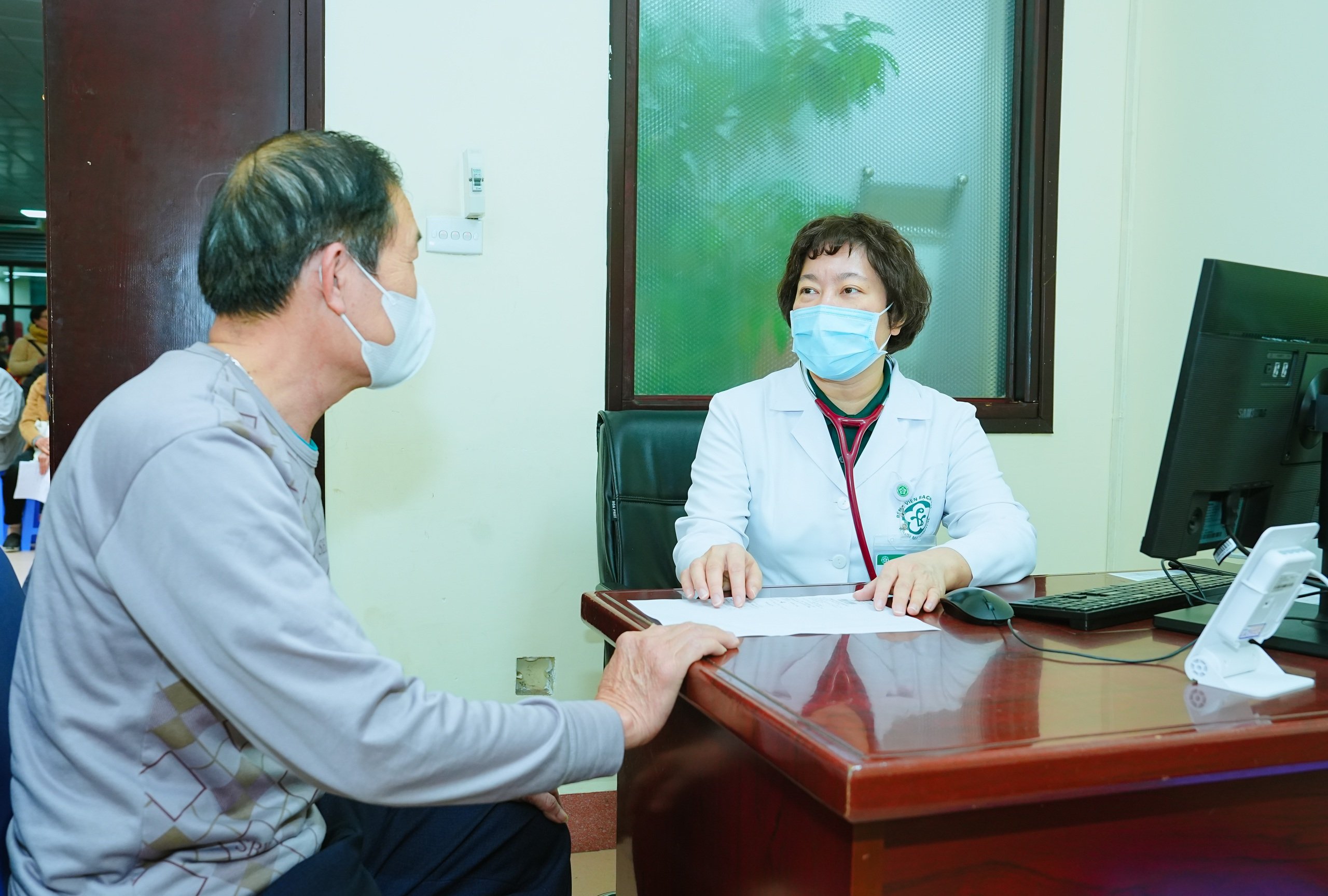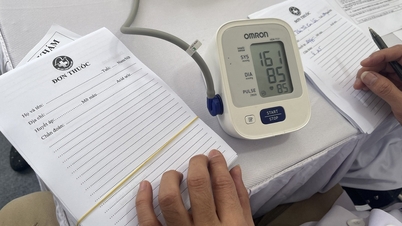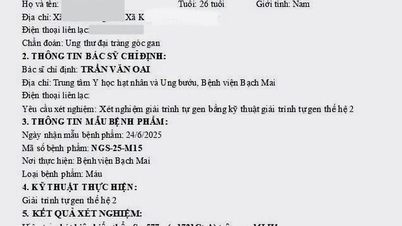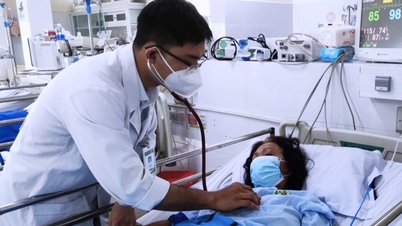What should heart patients pay attention to when getting a flu vaccine?
Faced with concerns about whether to get the flu vaccine, especially during the current flu epidemic, among many cardiovascular patients, Associate Professor, Dr. Nguyen Thi Thu Hoai, Director of the National Heart Institute, Bach Mai Hospital, emphasized: "Patients with cardiovascular disease should get the flu vaccine every year. This has been clearly recommended by prestigious cardiovascular associations such as the American Heart Association, the European Heart Association, and the Vietnam Heart Association. The flu vaccine reduces the risk of cardiovascular events by 15-45%. Vaccination is recommended for all cardiovascular patients, including those with heart failure or after coronary intervention, patients with hypertension, valvular heart disease, and cardiomyopathy.

Bach Mai Hospital doctors examine cardiovascular patients. (Photo: BD).
Dr. Thu Hoai added that cardiovascular patients need to see a cardiologist before getting the injection to ensure their cardiovascular condition and blood pressure are stable. Note, do not get the vaccine if the blood pressure is too high or too low or if the patient is in a cardiovascular emergency or has decompensated heart failure. Inactivated vaccines should be given to ensure safety and avoid live attenuated vaccines.
Entering the wet season, the risk of flu epidemic increases
The weather in the North is changing to cold and is predicted to continue to change to humid. In the context of the increasing number of people with seasonal flu, the weather is a favorable condition for the number of people with the disease to increase, especially patients with underlying diseases such as cardiovascular, respiratory...
According to Dr. Hoai, seasonal flu can aggravate symptoms in patients with heart failure and increase the risk of cardiovascular complications in both healthy people and patients with underlying cardiovascular disease.
Seasonal flu can cause fever, dehydration and increased oxygen demand when infected with flu, causing the heart to work harder, easily leading to acute decompensated heart failure in patients with heart failure, increasing the risk of arrhythmia in cardiovascular patients. In addition, patients with high blood pressure or heart failure are often prescribed vasodilators and diuretics by doctors, when infected with flu, patients can become dehydrated and have vasodilation due to fever, so it is necessary to consult a cardiologist immediately to adjust these medications.
Seasonal flu can also increase the risk of cardiovascular complications in both healthy people and especially patients with underlying cardiovascular disease. In some cases, seasonal flu can lead to acute myocarditis, causing acute arrhythmias, rapidly progressing acute heart failure, the disease will be more dangerous in patients with chronic cardiovascular disease.
Furthermore, seasonal flu often causes systemic inflammatory reactions, increasing the risk of blood clotting disorders, which will increase the risk of myocardial infarction and stroke in patients with atherosclerotic cardiovascular disease.
During the current flu "season", Associate Professor, Dr. Nguyen Thi Thu Hoai recommends three main issues that patients need to pay attention to: Medication regimen, lifestyle and diet.
With the medication regimen, patients need to maintain cardiovascular medication: Take the correct dose, do not stop on your own (including blood pressure medication, anticoagulants, statins). Most importantly, patients need to understand what medications they are taking and what their main effects are so they can monitor appropriately.
Some drugs commonly used to treat flu symptoms such as pain relievers and fever reducers, especially NSAIDs (ibuprofen...) or corticosteroids can worsen symptoms of heart failure and high blood pressure, so you should consult a cardiologist and infectious disease specialist before using them.
Flu can cause high fever, strong vasodilation and dehydration, so if cardiovascular patients are taking vasodilators or diuretics, they need to be closely monitored and the cardiologist managing the treatment should be notified for timely adjustment.
Regarding daily activities, heart patients need to get a flu vaccine every year; Prevent infection by wearing a mask, washing hands, and avoiding crowded places. At the same time, rest scientifically .
In addition, it is necessary to have a diet, strengthen immunity by supplementing vitamin C (orange, guava), zinc (seeds, meat), garlic; maintain fluid balance, drink enough water (1.5-2 liters/day); and control blood pressure by eating a low-salt diet, limiting animal fat, increasing green vegetables and fish.
"In case a cardiovascular patient has the flu, the patient needs to comply with the treatment regimen of the infectious disease doctor, consult the cardiologist who is managing the treatment about the cardiovascular regimen being used to see if it is necessary to adjust the cardiovascular medication or not. Immediately re-examine the cardiovascular system if there are symptoms such as prolonged rapid heartbeat, shortness of breath, chest pain, leg swelling...", Dr. Thu Hoai noted.
Source: https://www.baogiaothong.vn/benh-nhan-tim-mach-co-nen-tiem-vaccine-phong-cum-192250213160801864.htm





![[Photo] Binh Trieu 1 Bridge has been completed, raised by 1.1m, and will open to traffic at the end of November.](https://vphoto.vietnam.vn/thumb/1200x675/vietnam/resource/IMAGE/2025/10/2/a6549e2a3b5848a1ba76a1ded6141fae)












![[Video] Ministry of Health issues document to rectify medical examination and treatment work](https://vphoto.vietnam.vn/thumb/402x226/vietnam/resource/IMAGE/2025/10/2/54913f30a9934e18bcbb246c2c85f11d)



















































































Comment (0)